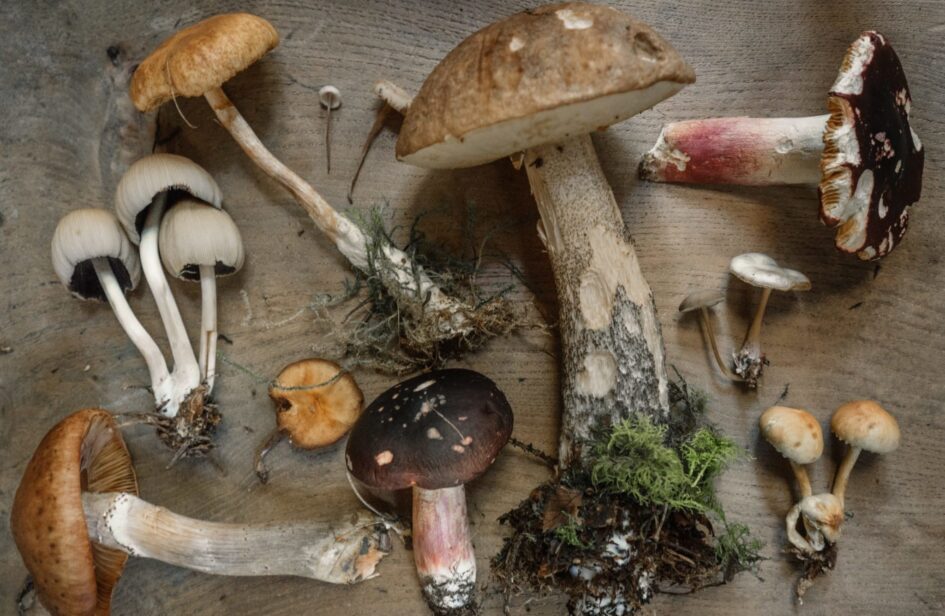Medicinal mushrooms have long been a mainstay in traditional Chinese medicine as well as being used in many other countries for their health benefits. There are quite a few varieties of mushrooms used medicinally, and you may have heard of several. Lion’s Mane and Reishi mushrooms get a lot of attention. We’ll discuss those here but also cover a couple of other lesser known types that may be worth looking into to improve your health. One thing to note regarding mushrooms, however, is that if you have an allergy to mold, you will likely also be sensitive to mushrooms. If this is you, you may want to look into treating that allergy before adding medicinal mushrooms to your health regimen.
Cordyceps
Cordyceps mushrooms might not be the most famous of the medicinal mushrooms, but they are proving to be superstars in their own right. Not only do they have powerful anti-inflammatory properties, but they also are high in antioxidants which means they may help treat or prevent high blood pressure. A compound within this type of mushroom, cordycepin, is molecularly similar to adenosine, a hormone produced by our bodies. Both adenosine and cordycepin relax blood vessels which leads to improved circulation resulting in reduced blood pressure. Studies show that those same blood vessel relaxing properties benefit the respiratory tract in a similar manner. According to a 2017 Chinese study, when taking cordyceps extract daily, airway constriction has been shown to be reduced in individuals with chronic moderate to severe breathing conditions. [1]
Another noteworthy benefit of cordyceps is its ability to help with athletic performance. A 2016 University of North Carolina study showed that consumption of cordyceps mushrooms extract can increase VO2 max (maximum oxygen intake). This helps an athlete’s body to produce more energy which translates into a longer performance time (such as a longer run) and a stronger performance, too (such as running faster). [2]
Reishi
Reishi mushrooms are perhaps most famously known for the benefits to the immune system. Reishi mushrooms do not stimulate the immune system but, rather, they help regulate it by encouraging it to dial up or down as needed. This is a great example of what is known as an adaptogen—it modulates the immune system either up or down based on the circumstances. This particular type of mushroom contains a polysaccharide that stimulates immune cells to do their job. By stimulating immune cells (not the entire system) the immune system produces more t-helper cells and killer cells, lymphocytes, and macrophages (white blood cells that destroy pathogens in the blood). All of these great benefits regulate the immune system to keep it in tip-top shape to fight off any threats to your health. So, in the case of an individual with a weakened immune system, this mushroom will help kick it into gear to reduce instance of illness or severity and duration of illness. In the case of an overactive immune system, such as one with many allergies and inflammatory conditions throughout the body, reishi mushrooms have been shown to calm the immune system. |3|
Lion’s Mane
This mushroom gets its name from its shaggy appearance that cascades downward much like a mane on, you guessed it, a lion. Lions are often used to depict a position of power and this mushroom certainly has a good supply of that! They are often used in the kitchen in countries like China, India, and Japan, but they also have a rich history of medicinal uses, as well. They are a particular standout for their positive impact on brain health.
It’s no secret that the brain’s ability to grow and form new connections declines with age. This can lead to cognitive dysfunction in folks as they approach their golden years. But lion’s mane mushrooms contain two compounds that have been shown to stimulate the growth of new brain cells: hericenones and erinacines. This is really exciting because it means that degenerative brain diseases that cause memory loss and other age-related forms of brain dysfunction can potentially be prevented by this truly magical mushroom. On a lesser scale, this mushroom can boost mental functioning in people at any stage of life. |4|
Shiitake
Let’s be honest. You probably haven’t been associating this particular mushroom with health benefits. However, you may have enjoyed it in a culinary masterpiece at your favorite eating establishment. And, if you’re being REALLY honest, you might even admit that you may have used the name of this mushroom in place of a more inflammatory word in a moment of frustration. (Speaking here for a friend…) But, did you know that shiitake mushrooms have some great health benefits like their previously mentioned counterparts?
One of the health benefits of shiitakes is the ability to fight obesity. A component in this mushroom, b-glucan (a soluble fiber also found in oats, barley, and rye) has been shown to increase satiety while decreasing food intake (possibly creating a caloric deficit which leads to weight loss) and reduce plasma lipid levels. |5|
Shiitake mushrooms also help support heart health. Phytonutrients contained in them prevent plaque buildup which helps maintain healthy circulation and blood pressure. In additions, sterol compound in the shiitake help mitigate the production of cholesterol in the liver to help keep cholesterol levels in a healthy range. |6|
Medicinal mushrooms are available in powder, tea, and capsule forms. You can, of course, also consume them in their whole form (shiitakes are probably easiest to obtain for this purpose). Many people find them a nice addition to their favorite hot beverage or even a smoothie. Whatever your preference, you can stop in at any of our locations and speak to our knowledgeable staff to help you find the option that best fits your needs.
Also, if you haven’t already, be sure to sign up for our email list. You’ll get more tips and information on each blog post, and you’ll also get store specials and other great info delivered right to your inbox.
Sources
- Herbal Medicine Cordyceps sinensis Improves Health-Related Quality of Life in Moderate-to-Severe Asthma (hindawi.com)
- Cordyceps militaris Improves Tolerance to High-Intensity Exercise After Acute and Chronic Supplementation: Journal of Dietary Supplements: Vol 14, No 1 (tandfonline.com)
- Ganoderma lucidum mycelia enhance innate immunity by activating NF-kappaB – PubMed (nih.gov)
- Neurotrophic properties of the Lion’s mane medicinal mushroom, Hericium erinaceus (Higher Basidiomycetes) from Malaysia – PubMed (nih.gov)
- Dietary Shiitake Mushroom (Lentinus edodes) Prevents Fat Deposition and Lowers Triglyceride in Rats Fed a High-Fat Diet – PMC (nih.gov)
- Effect of shiitake (Lentinus edodes) and maitake (Grifola frondosa) mushrooms on blood pressure and plasma lipids of spontaneously hypertensive rats – PubMed (nih.gov)
The information provided here is for educational purposes only. None of the research or evidence presented here is intended as a substitute for consulting an appropriate healthcare professional. These statements have not been evaluated by the Food and Drug Administration. The products offered here are not intended to diagnose, treat, cure, or prevent any disease. If you believe that you may have a disease condition, please consult your healthcare practitioner before using this or any other dietary supplement.



